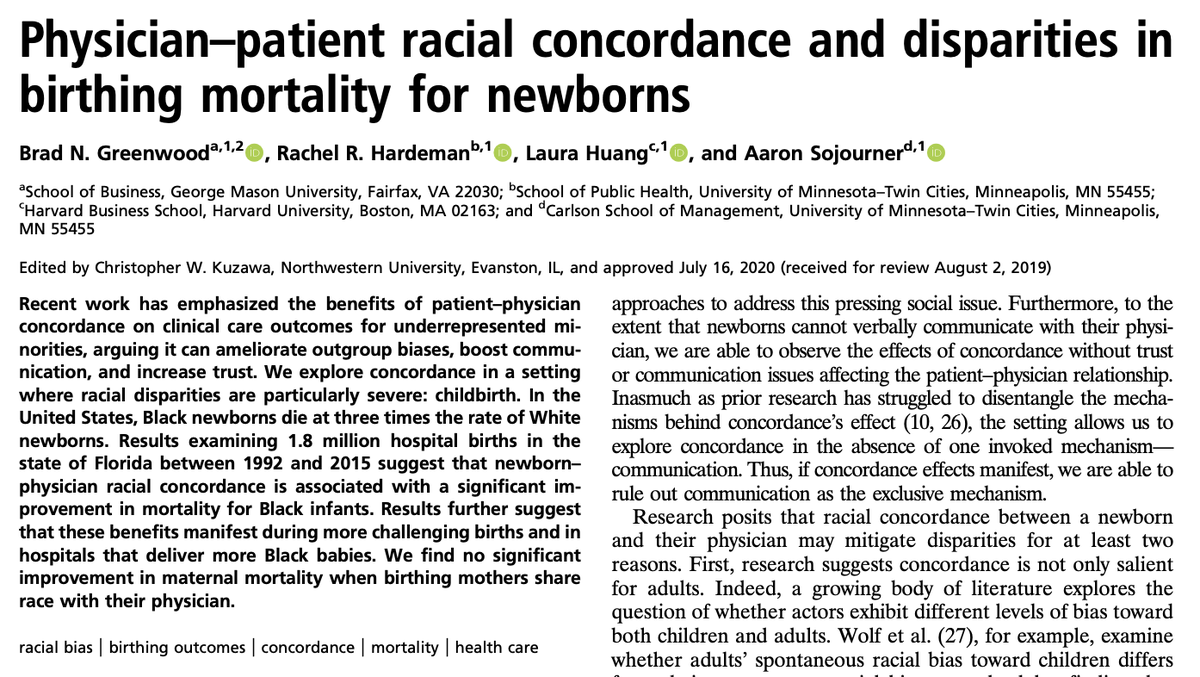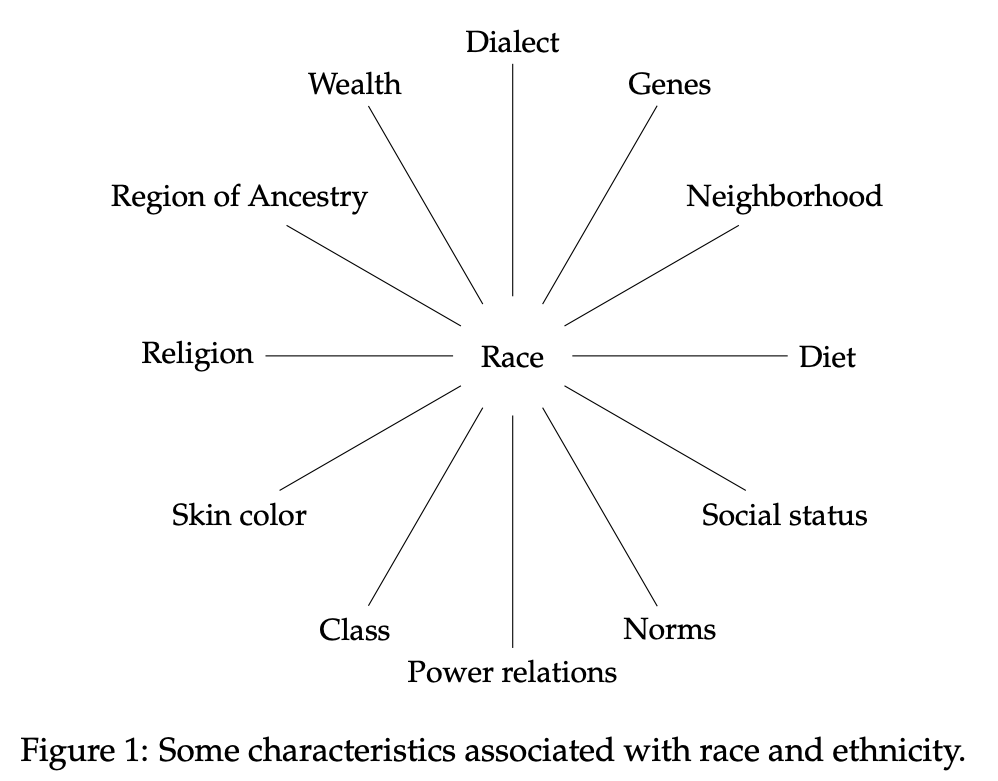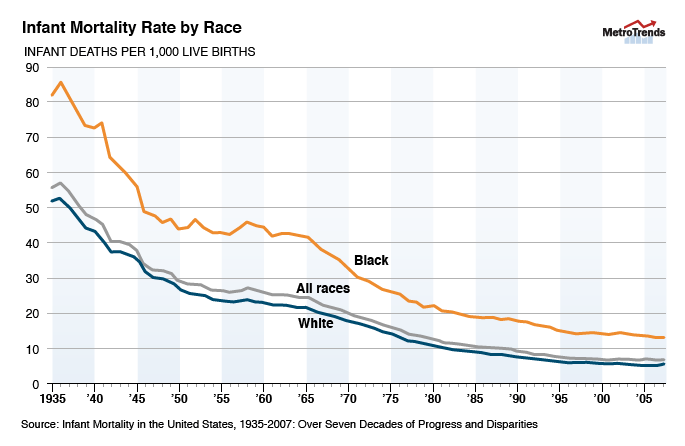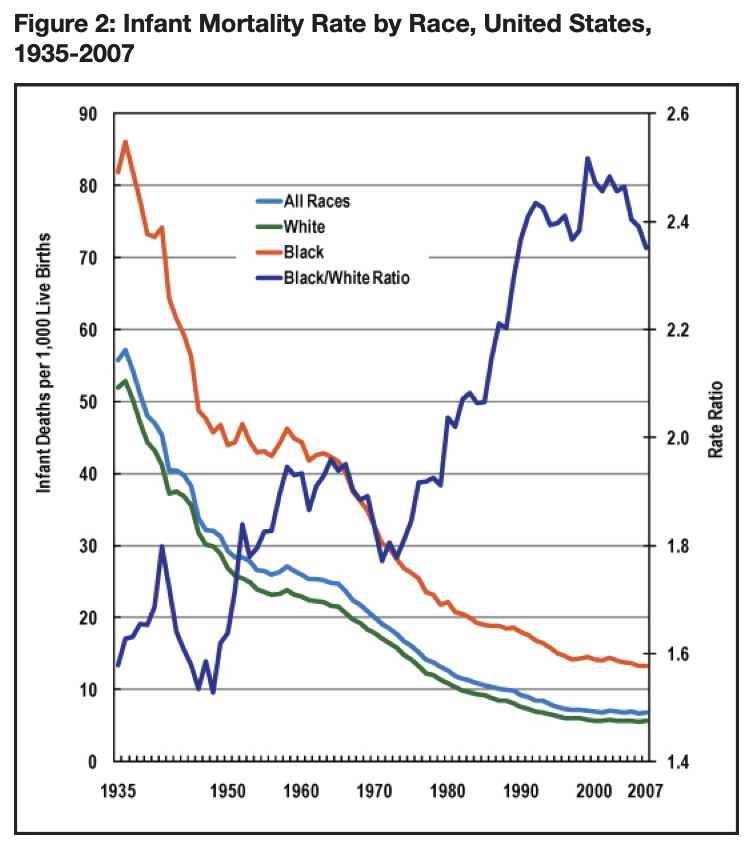A recent paper on infant mortality has been getting a lot of attention. A headline summarized: ”Black newborns more likely to die when looked after by White doctors.” There’s been a range of criticism but I think one key issue has been missed. 1/ https://www.cnn.com/2020/08/18/health/black-babies-mortality-rate-doctors-study-wellness-scli-intl/index.html">https://www.cnn.com/2020/08/1...
Before digging in, here’s the paper. The article looks at ”1.8 million hospital births in Florida between 1992 and 2015” and finds Black doctors are ”associated with a significant improvement in mortality for Black infants.” 2/ https://www.pnas.org/content/early/2020/08/12/1913405117">https://www.pnas.org/content/e...
This is an important issue and I’m glad the authors are trying to understand the “benefits of patient–physician [race] concordance for underrepresented minorities.” This @HiddenBrain podcast episode offers a good overview of the larger literature. 3/ https://www.npr.org/2019/06/03/729275139/people-like-us-how-our-identities-shape-health-and-educational-success">https://www.npr.org/2019/06/0...
That said, the methods and assumptions of the paper have come under criticism from medical scholars like @VPrasadMDMPH. He argues the results are “too weak” to support the claims highlighted by media. 4/ https://twitter.com/VPrasadMDMPH/status/1296155618282102785">https://twitter.com/VPrasadMD...
@VPrasadMDMPH raises important points about methods & assumptions but I want to address a larger issue about this entire category of research: “race concordance” effects alone tell us little to nothing about what is actually causing the outcomes we’re interested in. 5/
The authors acknowledge as much when discussing limitations of the paper. They write ”First, we are unable to observe the mechanism that is driving the observed result…” 6/ https://www.pnas.org/content/early/2020/08/12/1913405117">https://www.pnas.org/content/e...
This matters because without a clear mechanism, we lack a clear intervention to make things better. For example, an obvious explanation for these results is bias in medicine. 7/
And medical bias is real! I’ve spent a lot of time in hospitals helping my wife with a chronic health issue. Patients like her have been dismissed for decades partly due to scientists & doctors disbelieving women. See @jenbrea’s award winning doc: 8/ https://www.netflix.com/title/80168300 ">https://www.netflix.com/title/801...
One puzzle with the bias theory, though, is patient-doctor race concordance leads to “no significant improvement in maternal mortality.” If the issue is bias, why does it hurt newborns but not moms? 9/
Another possible implied solution is training and hiring more Black MDs. That’s vital! It’s also insufficient. In a big, diverse country, there are always going to be non-Black doctors delivering Black babies. What to do then? 10/
Another key problem with a lot of racial disparity & race concordance research is that the implicit suggestion is some kind of absurd race swap. How to fix the Black-White test score gap? Well, Black kids should just become White kids. 11/
How to make headway against a Black-White infant mortality crisis? Clearly, White doctors should become Black doctors. Trading Places might be fun in movies but as a subtly implied solution in real life it’s ludicrous and useless. 12/
We can do better. In a co-authored paper with @maya_sen, we argue for thinking of race as a “bundle of sticks” comprised of many elements. 13/ https://www.annualreviews.org/doi/abs/10.1146/annurev-polisci-032015-010015">https://www.annualreviews.org/doi/abs/1...
Once we think of the possible “Black doctor” effect as being a bundle of many things, we can begin to try and disaggregate “Black” to isolate specific factors. For example, maybe Black doctors acquire more knowledge about specific issues facing Black newborns. 14/
Maybe Black doctors, on average, deliver more Black babies and then develop expertise in addressing complications that arise. The study did find “benefits accrue more sharply in more medically complicated cases.” 15/
Assuming something real is at play, whatever it is, it’s something Black doctors are *doing* not something that magically arises from their *being*. In other words, if the results are right, what Black doctors know and do could be taught to non-Black doctors. 16/
Only by identifying the mechanism — the knowledge, processes, habits of mind, cultural competence or behavior — that undergirds these differential effects by race can we really make progress. 17/
For a good overview of the “bundle of sticks” approach, particularly in light of racial disparities with Covid, see this recent summary in Scientific American by
@SamWinterLevy and Bryan Schonfeld. 18/
https://www.scientificamerican.com/article/how-to-study-racial-disparities/
[..]">https://www.scientificamerican.com/article/h...
@SamWinterLevy and Bryan Schonfeld. 18/
https://www.scientificamerican.com/article/how-to-study-racial-disparities/
[..]">https://www.scientificamerican.com/article/h...
In sum, studies of “race concordance” even when results are credible, are mainly helpful to describe an inequality, not to identify solutions. Until we isolate the elements of race that matter, we cannot understand how difference is turned into disparity. fin/
Addendum: I want to address a handful of questions and comments that have come up. First, to be very clear, the difference in infant mortality by race in America is a national disgrace and we need more good research & policy to make headway. https://www.urban.org/urban-wire/despite-fifty-years-improvements-infant-mortality-large-black-white-gap-remains-unchanged">https://www.urban.org/urban-wir...
It’s important to note that in absolute terms, infant mortality has decreased significantly over the last century. For Blacks, going from 80+ deaths per 1,000 to ~11 per 1,000 is enormous progress.
At the same time, racial inequality persists and Black infants have over twice the risk of dying as White infants according to recent studies: https://www.hrsa.gov/sites/default/files/healthitBACKUPJan6-17/HealthITArchive/images/mchb_infantmortality_pub.pdf">https://www.hrsa.gov/sites/def...
Second, we know these inequalities exist because of studies that describe the world, even without a cause or a mechanism. Descriptive work is essential. I teach my students the mantra “the first act of science is to observe.” I didn’t intend for thread to suggest otherwise.
As @AmeliaNGibson suggests, a “Yes, and” framing of this thread might have been better. I agree. https://twitter.com/AmeliaNGibson/status/1297049967740297217">https://twitter.com/AmeliaNGi...
Third, on the question of doctor bias, I raised the puzzle as to why a race of doctor effect would apply to newborns and but not moms. There were a number of helpful responses. See this short thread by @MaxJordan_N. https://twitter.com/MaxJordan_N/status/1296916297809354752">https://twitter.com/MaxJordan...
Also, @ikuziemko notes “Maternal mortality is *really* rare relative to infant mortality.” https://twitter.com/ikuziemko/status/1296990503058145282">https://twitter.com/ikuziemko...
Fourth, I’m not arguing that race (and gender) concordance effects aren’t real. One experiment “found Black men [randomly] assigned to a Black doctor did accept more preventative services.” https://www.npr.org/2019/06/03/729275139/people-like-us-how-our-identities-shape-health-and-educational-success">https://www.npr.org/2019/06/0...
“Black doctors were about 50% more successful than non-black doctors at getting their patients to agree to invasive tests for diabetes and the flu shot. When it came to cholesterol screening, they were 72% more effective.”
So when I wrote ”it’s something Black doctors are *doing* not something that magically arises from their *being*” I want to clarify I was thinking of newborns with no awareness of a doctor’s race. We know children in school & adult patients respond to someone of same race/gender.

 Read on Twitter
Read on Twitter
![This is an important issue and I’m glad the authors are trying to understand the “benefits of patient–physician [race] concordance for underrepresented minorities.” This @HiddenBrain podcast episode offers a good overview of the larger literature. 3/ https://www.npr.org/2019/06/0... This is an important issue and I’m glad the authors are trying to understand the “benefits of patient–physician [race] concordance for underrepresented minorities.” This @HiddenBrain podcast episode offers a good overview of the larger literature. 3/ https://www.npr.org/2019/06/0...](https://pbs.twimg.com/media/Ef9yPWGXkAEari3.jpg)





